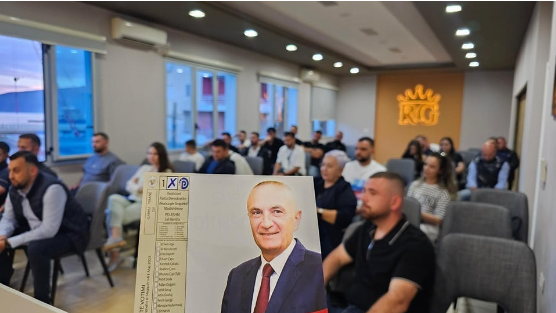In a political career that has spanned over three decades, Ilir Meta`s fall from political prominence following the May 11 elections marks a significant turning point not only for him but for Albanian politics as a whole. A man who was once seen as one of the most influential figures in the country, having served as President, Speaker of Parliament, and Prime Minister, Meta is now facing what could be the most humiliating defeat of his career.
Meta, leader of the Freedom Party (Partia e Lirisë), has experienced a dramatic drop in support, particularly in his home district of Tirana. Once a key player in Albanian politics, the results from the May 11 election are poised to render Meta without a parliamentary seat—a blow that is arguably the greatest of his long-standing career. With his vote tally in Tirana being significantly lower than the votes received by other candidates from his coalition, the political figure known for his political acumen now finds himself out of the race.
The Decline of Meta’s Political Influence
Meta’s journey from a dynamic and youthful political leader, entering Parliament at the age of 23 in 1992, to his current position—facing likely exclusion from the upcoming Albanian legislature—is marked by a series of political missteps. His Freedom Party, which emerged after his acrimonious split from the Socialist Movement for Integration (LSI), has failed to replicate his former success. In the 2021 elections, Meta’s party secured a considerable number of votes, with his personal popularity helping secure a foothold in Parliament. However, the party`s support base has steadily eroded, and in the May 2025 elections, the results speak for themselves.
In Tirana, where Meta’s party received less than one-quarter of the votes it secured in 2021, he seems to have lost any hope of returning to Parliament. Current projections suggest that Meta will receive between 6,000 and 7,000 votes, a dramatic reduction from previous years. Comparisons with the opposition show how far Meta has fallen: he ranks fourth on his coalition`s list, trailing behind other prominent opposition figures such as Ilir Alimehmeti and Jorida Tabaku, whose support is multiple times greater. His situation is further compounded by the fact that he is in pretrial detention, under investigation for charges of corruption, money laundering, and asset concealment.
The Fall of a Political Titan
Ilir Meta’s defeat symbolizes more than just the collapse of one politician’s career; it reflects a broader shift in the Albanian political landscape. His repeated refusals to adapt to modern political realities and his reliance on the old alliances and divisions of Albanian politics have resulted in an inevitable decline. Once celebrated for his ability to navigate the complexities of Albania`s transition from communism, Meta now finds himself outpaced by younger, more dynamic political forces. Meta`s political history is one of strategic alliances and calculated risks. His refusal to accept the safe option of an electoral list spot in favour of running in a high-risk district like Skrapar in 2005, which he won, was emblematic of his defiant, risk-taking nature. However, two decades later, the political climate has drastically shifted. His refusal to heed the advice of his ally, Sali Berisha, to secure a “safe“; spot on the electoral list seems emblematic of his stubbornness, which may have sealed his fate. His current situation, combined with his legal troubles, positions him at a significant disadvantage in the current political environment. Meta’s 33 years in politics seem to be coming to an unceremonious close, as the public increasingly distances itself from his populist rhetoric and political tactics.
Meta’s Last Stand
Despite the grim outlook, Meta has not gone quietly into political obscurity. From his prison cell, he continues to criticize the current Albanian government, calling outnalleged electoral fraud and corruption. In a recent statement on Facebook, Meta accused the government of sabotaging the election process, particularly through the alleged ``electoral banditry“ and vote-buying activities in the district of Vorë, as well as irregularities in the capital, Tirana. In typical fashion, Meta has framed his situation as a fight between the “status quo” and the forces of change. He has called for mass participation in future protests and urged his supporters to rally behind the cause of electoral reform and the preservation of democracy. His combative rhetoric, however, has failed to translate into electoral success.
As the final vote counts are being tallied, it seems increasingly unlikely that Meta will secure the necessary votes to maintain a seat in Parliament. The fall of Ilir Meta is a reminder of the volatile and ever-shifting nature of Albanian politics. For many, it represents the end of an era that began in the early 1990`s, with Meta as one of the key figures of the post-communist political transition. His defeat marks the conclusion of his long reign as one of Albania’s most influential political figures, leaving questions about the future direction of the political forces he once commanded.
A Changing Political Landscape
While Meta’s political future seems bleak, his fall from power also highlights a significant shift in the political landscape of Albania. Younger leaders, like the ones gaining ground in both the ruling Socialist Party and the opposition, have proven more adaptable to the changing demands of the electorate. As Albania moves forward into an increasingly globalized and modernized era, it is clear that the politics of old—characterized by long-standing rivalries, political manoeuvring, and entrenched personalities—are being replaced by newer, more dynamic forces. For Ilir Meta, the May 11 elections will undoubtedly go down in history as the moment when his political career came to a crashing halt. Whether this marks the end of an era or the beginning of a new chapter for Albania’s evolving democracy remains to be seen, but one thing is certain: the Albanian political scene is no longer his to command.
Written by our correspondent A.T.



